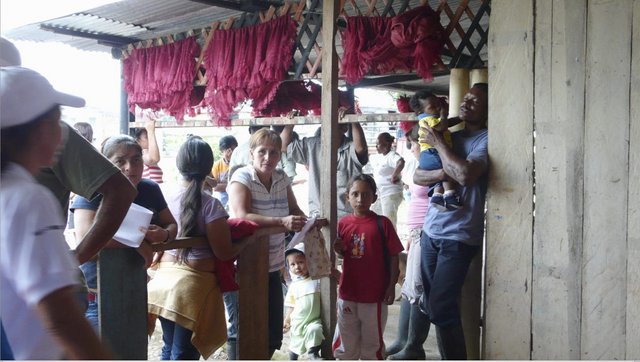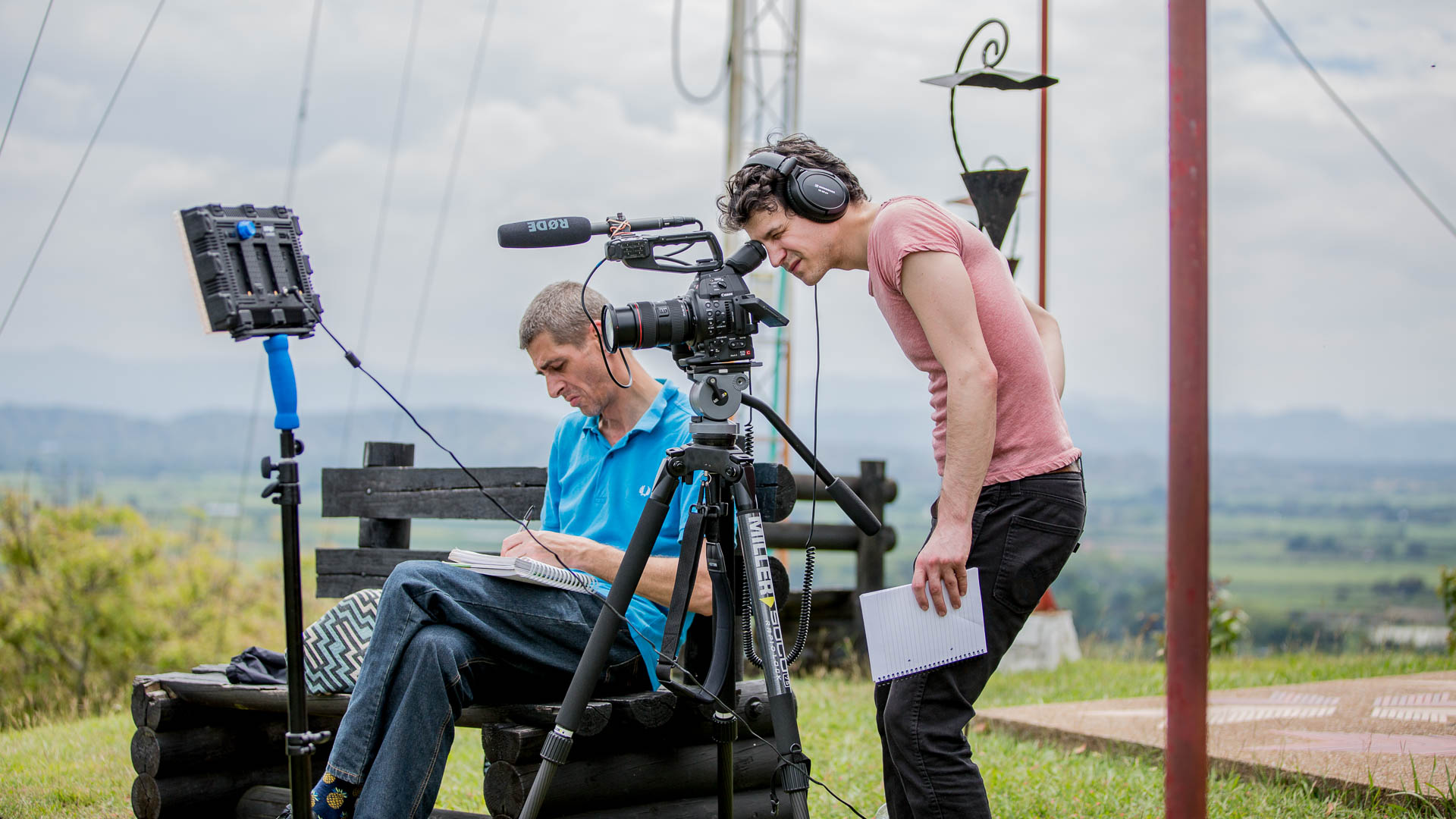
On a chaotic street in this jungle border town, the line forms early outside the U.N. refugee office.
A pregnant mother of three who refused to identify herself out of fear for her security said she recently fled her Colombian river community of El Limon after violence worsened.
Colombian refugees in Puerto Nuevo "Gunmen with face masks came to my neighbor's house and told her to leave. The next day I sold our chickens, grabbed the kids and left," said the woman, who joined the line outside the U.N. refugee office on a recent morning.
Amid lingering diplomatic tensions over Colombia's March 1 military raid on a rebel camp of the Revolutionary Armed Forces of Colombia, or FARC, attention inside Ecuador has turned to humanitarian problems.
Colombian refugees are streaming into Ecuador to escape what they call the crossfire of a drug-fueled civil war and the poisonous flyovers of U.S.-backed counternarcotics planes.
The Ecuadorean government says 250,000 to 300,000 Colombians live in Ecuador legally and more are there without permission.
In March, U.N. High Commissioner for Refugees Antonio Guterres said about 60,000 Colombians are in need of international protection in Ecuador's northern provinces. Half of them live near Ecuador's impoverished, dangerous and underdeveloped border with Colombia, the agency said.
The UNHCR office in Lago Agrio, a two-hour drive to the San Miguel River, is one of the country's busiest, said Xavier Creach, who heads the local mission.
Mr. Creach's team frequently reaches out to towns like Puerto Nuevo, registering refugees, pressing Ecuadorean officials for public investment and trying to reduce tensions between the town's leaders and the Ecuadorean military.
But where aid workers see a potential humanitarian disaster in Ecuadorean border towns brimming with Colombian refugees, military officials see other risks.
"During the day these refugees can be dressed in civilian clothes and say, 'I am a farmer,'" said Col. Javier Perez of Ecuador's 4th Army Division. "But at night that same person could wear camouflage. We don't know who is a guerrilla and who isn't."
Rebels with Colombia's FARC, Latin America's oldest Marxist guerrilla movement, have been fighting to overthrow the Colombian government for more than a generation.
With several recent setbacks, including the March raid that killed No. 2 leader Raul Reyes and the March 26 death of longtime leader Manuel "Sureshot" Marulanda of an apparent heart attack, FARC rebels are thought to be sheltering along the Ecuadorean border.
Col. Perez estimated that nine out of 11 people in Ecuadorean border communities along the San Miguel River are Colombian nationals.
Military officials say one of the most ill-reputed communities is Puerto Nuevo, a gritty settlement on the Ecuadorean side of the river, which separates the countries.
A sweltering collection of low-slung buildings, restaurants and brothels, Puerto Nuevo sits on Ecuadorean soil, but about 80 percent of its inhabitants are Colombian, local leaders say. Military officials put the number at 90 percent.
Across the river, a few minutes by boat, Colombian jungle spreads in all directions. Boat traffic is near constant. Bars, restaurants and brothels here charge in Colombian pesos. Men play pool in a bar as a horse-drawn buggy collects trash and three men prepare a soccer goal for an upcoming match.
On a hill above town, funds from the United States Agency for International Development have been used to build a water purification system.
Though a clinic is being built, aid workers, including a Red Cross representative, say basic services such as a high school are nonexistent, and diseases such as malaria and dengue are common.
So are anger, suspicion and danger.
Jose Reyes, a town leader and no relation to the slain guerrilla commander, said Puerto Nuevo is cast unfairly as a FARC haven by Colombian and Ecuadorean military units.
"Many in the Ecuadorean military say we are the monster of Ecuador," he said. "They and the Colombians think we are FARC but we aren't. We don't have anything to do with the politics of Colombia."
The biggest threat, Mr. Reyes said, is from Colombian troops who often intimidate the town, firing mortars from across the river and sometimes crossing into Ecuadorean territory.
He pointed to a concrete building with pockmarks and pellet-sized holes in a tin roof, which he said was hit by Colombian mortar fire.
"But Ecuadorean troops refuse to set up a post here and protect us," he said, adding that Ecuadorean patrols wearing face masks in past months have scared children and locals.
Col. Perez said his units patrol Puerto Nuevo daily despite the dangers and the town's aggressive leaders who confront them and file human rights complaints. He said his troops have worn face masks because Ecuadorean soldiers have suffered retaliatory killings.
Ecuadorean military officials blame Colombia for not patrolling its side of the San Miguel and Putumayo rivers, and of breaking a promise to build permanent military posts in the region.
Colombia's ambassador to the Organization of American States, Camilo Ospina, interviewed by telephone in Washington, said the March 1 cross-border attack was "an exceptional, one-time situation" undertaken after Colombia made repeated overtures to the Ecuadorean government about the existence of the rebel camp.
Mr. Ospina insisted that Colombia has a strong presence along the border, and said the reason Colombia has not set up a permanent post is logistical.
"Cocaine producers are highly mobile," he said. "If you position your troops in one location, you lose the flexibility to respond."
Mr. Ospina also claimed that Colombia stopped fumigation of coca crops within six miles of the Ecuadorean border two years ago.
Col. Perez said Colombian residents in Puerto Nuevo have illegally obtained an Ecuadorean identification card called a cedula.
Many, however, have no form of ID.
On a sweltering morning recently, Colombian refugees came to Puerto Nuevo by boat and lined up at a temporary U.N. field mission that processed refugee applicants and issued temporary U.N. identification cards.
"Jimmy," a young Colombian who had no identification, said having a cedula number or U.N. identification can be a matter of life or death. Jimmy and others interviewed in Puerto Nuevo said Colombian troops frequently cross into Ecuadorean territory.
"If Ecuadorean troops catch you without one, you are in trouble," he said. "But if Colombian troops catch you it's worse. They will think you are a FARC and kill you."
To be safe, Juan Escobar, an Ecuadorean citizen and one of Puerto Nuevo's community leaders, has tattooed his cedula number in large, crooked letters running down his forearm.
"That way I won't lose it, and if they kill me they know who I am," he said.

Education Resource
Meet the Journalists: Sara Reardon, Adam Levy, Greg Kendall-Ball
For decades Colombia has been haunted by civil war. In 2016, the government signed a peace treaty...






